Snoring & Sleep Apnea
Sleep Apnoea
What is Obstructive Sleep Apnoea?
Obstructive sleep apnoea occurs when the airway at the back of the mouth obstructs (partially or fully) during sleep and breathing is reduced or stops altogether. The brain then detects the lack of oxygen and prompts a momentary arousal to draw breath. Breathing may stop a dozen, even a hundred times a night, with each stoppage lasting 10 seconds to over a minute. Sleep apnoea can occur at any age.
Symptoms of Obstructive Sleep Apnoea
You may snore, toss and turn and/or stop breathing during the night. You may complain of waking up during the night gasping and choking, or your bed partner may notice the patterns. Other symptoms of sleep disorders include lack of concentration during the day and a feeling of tiredness or fatigue. This may result in poor work performance, reduced cognitive function, and an increase in workplace and motor vehicle accidents due to lack of concentration.
Why You Should Be Treated for Obstructive Sleep Apnoea?
OSA is a serious medical condition. You’re high-risk for cardiovascular disease and high blood pressure (hypertension). It has been linked to excessive tiredness, memory problems, depression, reduced resistance to infection and increased risk of high blood pressure and heart disease. It is also shown to increase the risk of stroke and sudden death. If not treated, sleep apnoea poses significant threats to your health and well-being.
How is Sleep Apnoea Diagnosed and Treated?
If symptoms point to the possibility that you may have sleep apnoea, the most accurate way to diagnose it is with an overnight sleep study. You will be provided with a Sonomat mattress to sleep on for a night in the comfort of your own home. This mattress measures your breathing patterns and records any partial or complete obstructions. It also records snoring and movement during the night, to allow us to objectively measure how well you breath and sleep each night.
If snoring or sleep apnoea is diagnosed, a removable oral dental device can be fitted between your teeth, which holds the jaw forward—assisting in keeping your airways clear. This device is worn only at night, and many patients find it more comfortable and easier to use than a nasal mask.
Other things that may help to improve sleep apnoea include: losing weight (if needed), minimizing or avoiding alcohol, sleeping pills, caffeine, and large meals late in the evening.
Snoring
What Causes Snoring?
Snoring is a result of partial blocking of the upper airway. When you fall asleep your muscles relax, including those that control the tongue and throat. The soft tissue (or flesh) at the back of your throat can sag, narrowing the airway. Incoming air then makes the tissue at the rear roof of the mouth (soft palate), the flap of skin hanging from the palate (uvula), and the throat vibrates—a sound we know as snoring.
Why Diagnose and Treat Snoring?
Loud snoring can not only cause you trouble at home (preventing your family from having a solid and peaceful night’s sleep), it can also be a sign of a more serious problem—Obstructive Sleep Apnoea (OSA). Over 10% of regular snorers have it to a significant degree. Latest evidence links snoring with increased hypertension, stroke and cardiovascular disease. For this reason, there is no such thing as benign snoring; if left untreated, the condition will worsen with time, leading to potentially life-threatening consequences.
Dental Treatment for Snoring
We provide a treatment called a Mandibular Advancement Splint. It’s a fitted mouthguard between your teeth, which pushes your lower jaw forward as you sleep, helping to keep your airway unobstructed and thus minimize snoring.
Dr. Joachim Ngiam is a dedicated dental sleep practitioner who has presented internationally about the benefits of the treatment of snoring and obstructive sleep apnoea (OSA). Early in his career, Dr. Ngiam learned about the benefits of proper nasal respiration in the growth and development of the growing child and in adults. His preventative approach has led to a combined treatment approach to ensure healthy breathing practices in both adults and children.
Dr. Joachim Ngiam recently presented his research at the American Academy of Dental Sleep Medicine (AADSM) annual meeting in Minneapolis, USA and was awarded a winner of the AADSM Graduate Student Research Award 2011, in recognition of outstanding research in dental sleep medicine. Additionally, his research was featured in the Sleep Review, a journal for sleep specialists in the USA.
If you have been heard to snore, gasp for breath at night, or are excessively sleepy during the day, make an appointment today and give Dr. Joachim Ngiam a chance to improve your quality of life.
